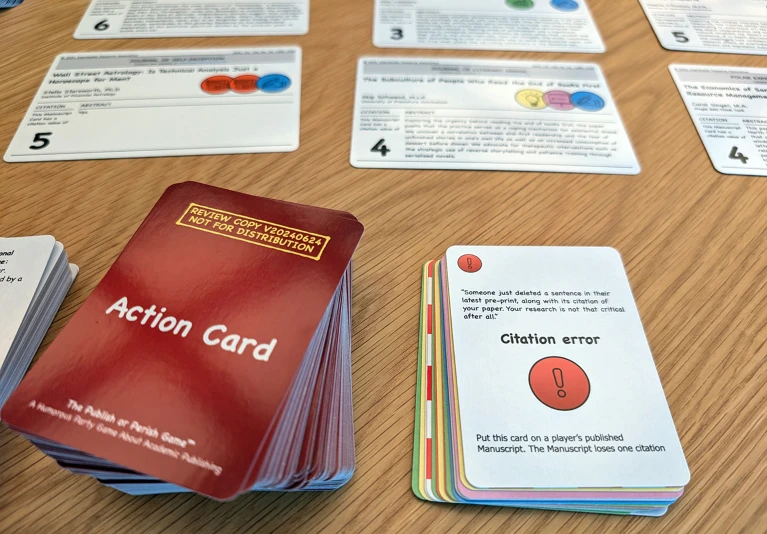
A prototype of a card game designed to allow frustrated academics to blow off steam.Credit: Max Bai/Publish or Perish
Fabricating data, throwing academic shade at other scientists, publishing a mountain of papers that receive a towering heap of citations: cynics might describe these as steps necessary to achieve academic success.
They are also goals for players of ‘Publish or Perish’ — a new card game that might hit close to home for researchers trying to navigate the often-labyrinthine and cut-throat institution of academia. The name refers to the common description of academia as a system that rewards researchers who publish their findings in prestigious scholarly journals and punishes those who don’t.
The game is the brainchild of Max Bai, an independent political social psychologist based in Minnetonka, Minnesota. Bai has released a ‘beta’ version of the game that has been play-tested by several researchers. The concept has struck a chord with scientists on social media, some of whom have leapt at the opportunity to pre-order the game before it is officially released.
With fake manuscript titles ranging from “Unpacking the Aerodynamics of Flying Pigs” to “Why Dogs Follow You into the Bathroom: Insights into Canine Codependency”, the game aims to poke fun at the “absurdity” of what it takes to build a successful scientific career, says Bai.
Close to home
Players compete to churn out papers and attract citations. The player with the highest number of citations at the end of the game wins. To publish a manuscript, players must accrue ‘research cards’ that represent every component of a publication — ideas, writing, data, theory and references.

A game card for a paper with a ludicrous title awards the holder four citations.Credit: Max Kozlov/Nature
If only it were so simple! Your fellow academics can sabotage you by playing cards that call for an audit of your work by an institutional review board, flag a citation error or point out that your “genius new theory” has already been discovered and named. Players can simultaneously face several of these cards, some of which lower your citation count and prevent you from publishing new manuscripts, “just like in real life”, as the game’s rules say.
To deal with these setbacks, players can use cards that allow them to engage in dodgy practices such as plagiarism and a type of statistical manipulation called P-value hacking. These cards allow players to try to stump their opponents with scientific trivia questions. Not all cards are negative: as in real life, some cards reward you for collaborations and attending workshops.
Any collaborations are likely to be short-lived, because backhanded compliments and unconstructive criticism are not only encouraged but also rewarded with extra citations. At the end of the game, players must deliver an on-the-spot ‘defence’ of the ridiculous papers they’ve published over the course of the game. The player with the best presentation receives a few extra citations.
A break from the bench
The game was designed to give overworked graduate students, who are experiencing burnout at record-high rates, a good laugh, Bai says. The game riffs on “the difficulty of dealing with the reviewing process and getting a job, finding your [adviser], securing funding, nepotism — the whole enchilada”, says Bai.

Some cards award citations to player; others, like those that point out citation errors, dock citations.Credit: Max Kozlov/Nature
The game is a “medium to socialize using the collective trauma people experience in academic life”, he adds. “I don’t see that people have a good way to vent out this built-up stress. I wanted to create an outlet for people.”
In the next few months, Bai plans to launch the game on the crowdfunding platform Kickstarter, where it will be available for purchase.



